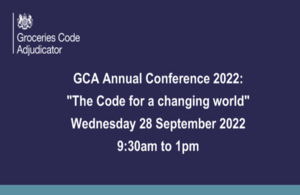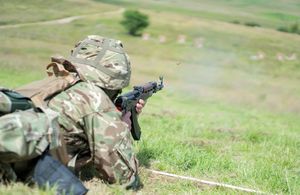GCA to host annual conference on 28 September 2022
News story
Mark White, the Groceries Code Adjudicator (GCA) will hold his second annual conference on 28 September 2022.

Registration is now open for the GCA Annual Conference 2022: “The Code for a changing world”, which the GCA will hold online on Wednesday 28 September, between 9:30am and 1pm (BST).
This year’s conference brings together supplier representatives, designated retailers and other experts to discuss challenges the grocery sector is facing and support available for suppliers. There will be an opportunity to ask speakers and panel members questions throughout the conference and meet with the Groceries Code Adjudicator, Mark White and Code Compliance Officers in the afternoon.
Mark White said:
As the groceries sector faces a range of challenges from inflationary pressures to raw ingredient shortages, my annual conference offers a unique opportunity for the sector to come together and discuss how these challenges can be resolved.
We are putting together some really interesting expert panels and talks, including a close look at our recent survey results and I encourage everyone to attend.
The event is free to attend. Register now to guarantee your place.
The GCA will share information about how to set up meetings with the Adjudicator and Code Compliance Officers closer to the event.
Published 11 July 2022
